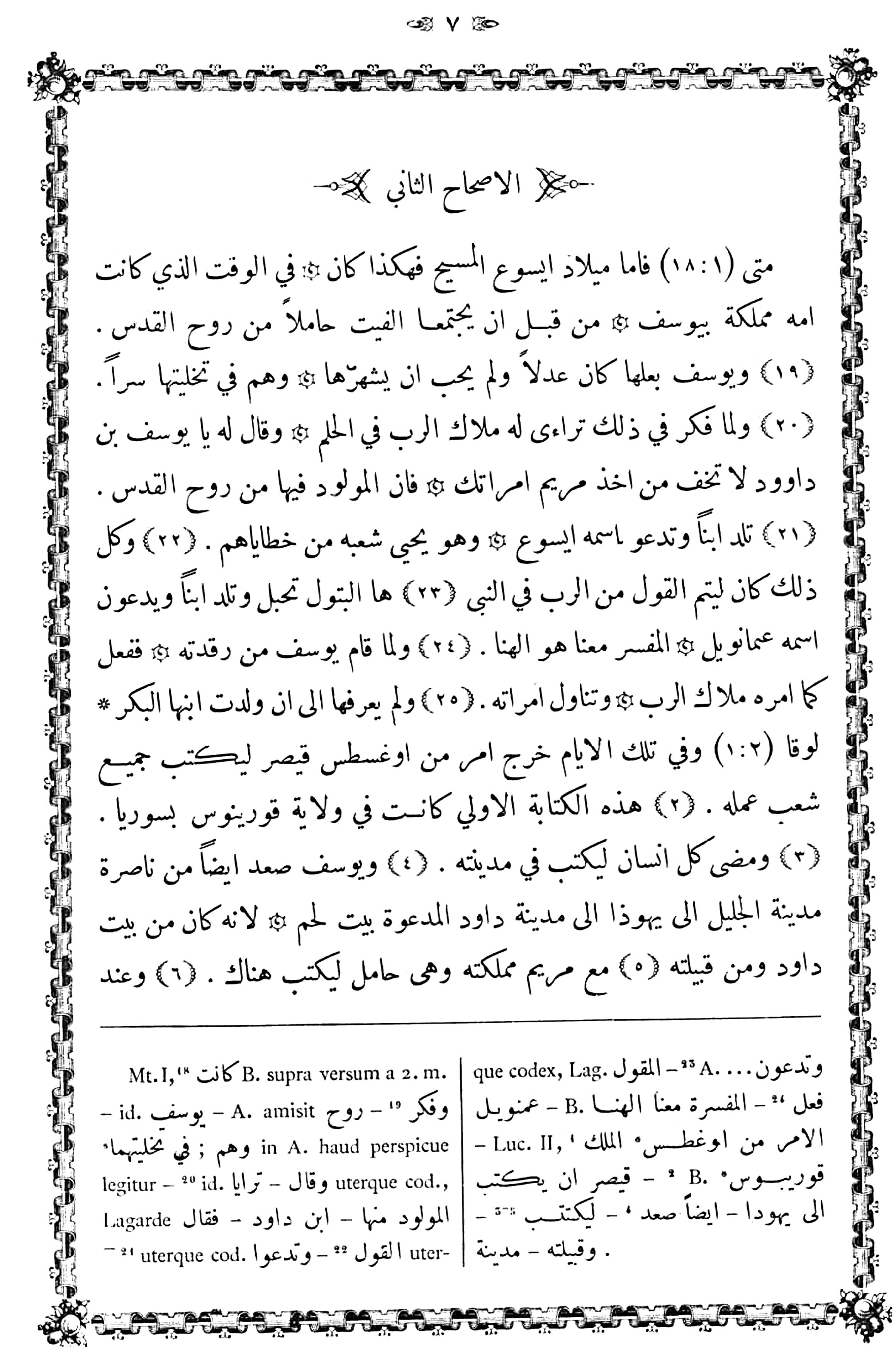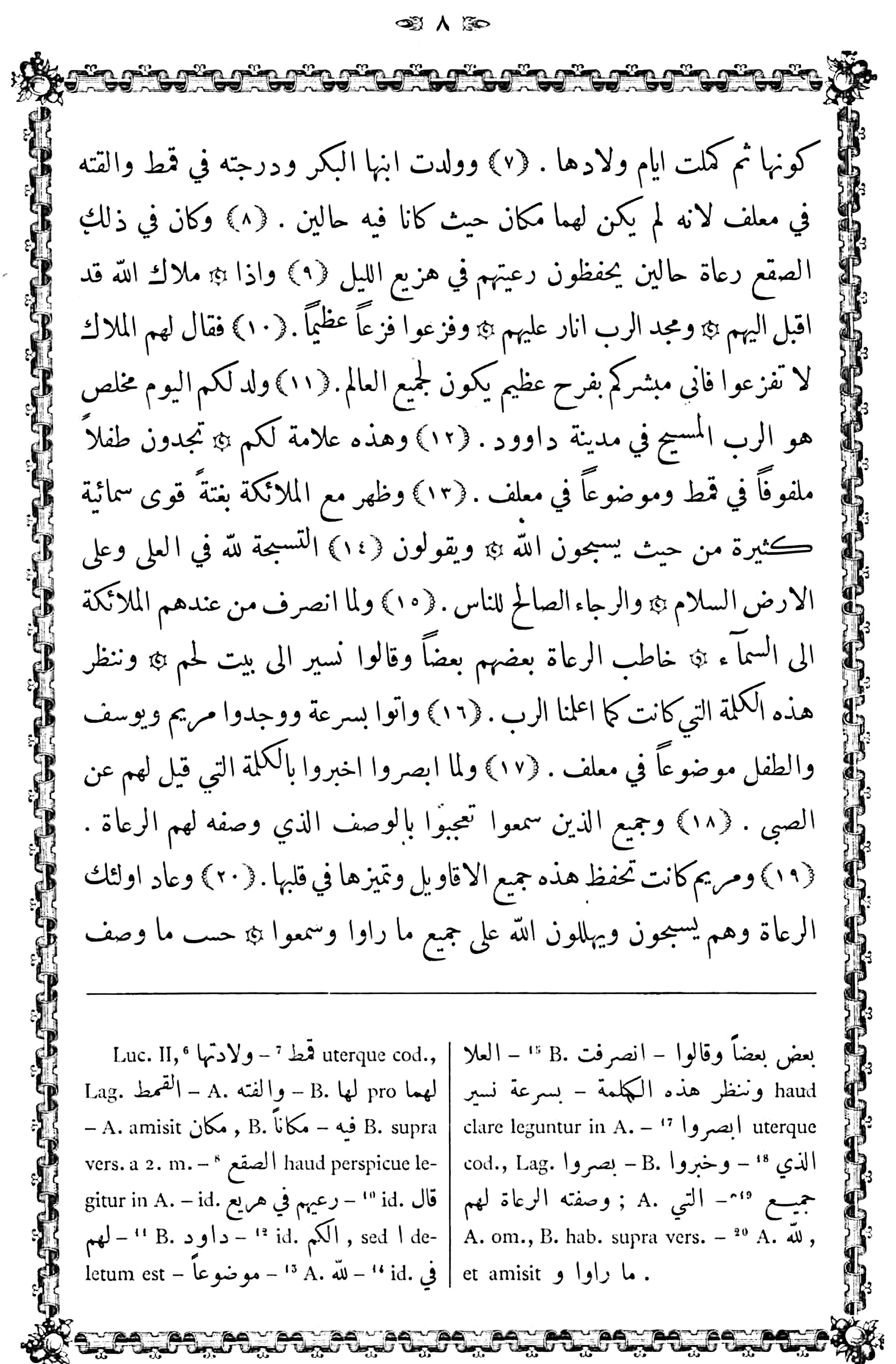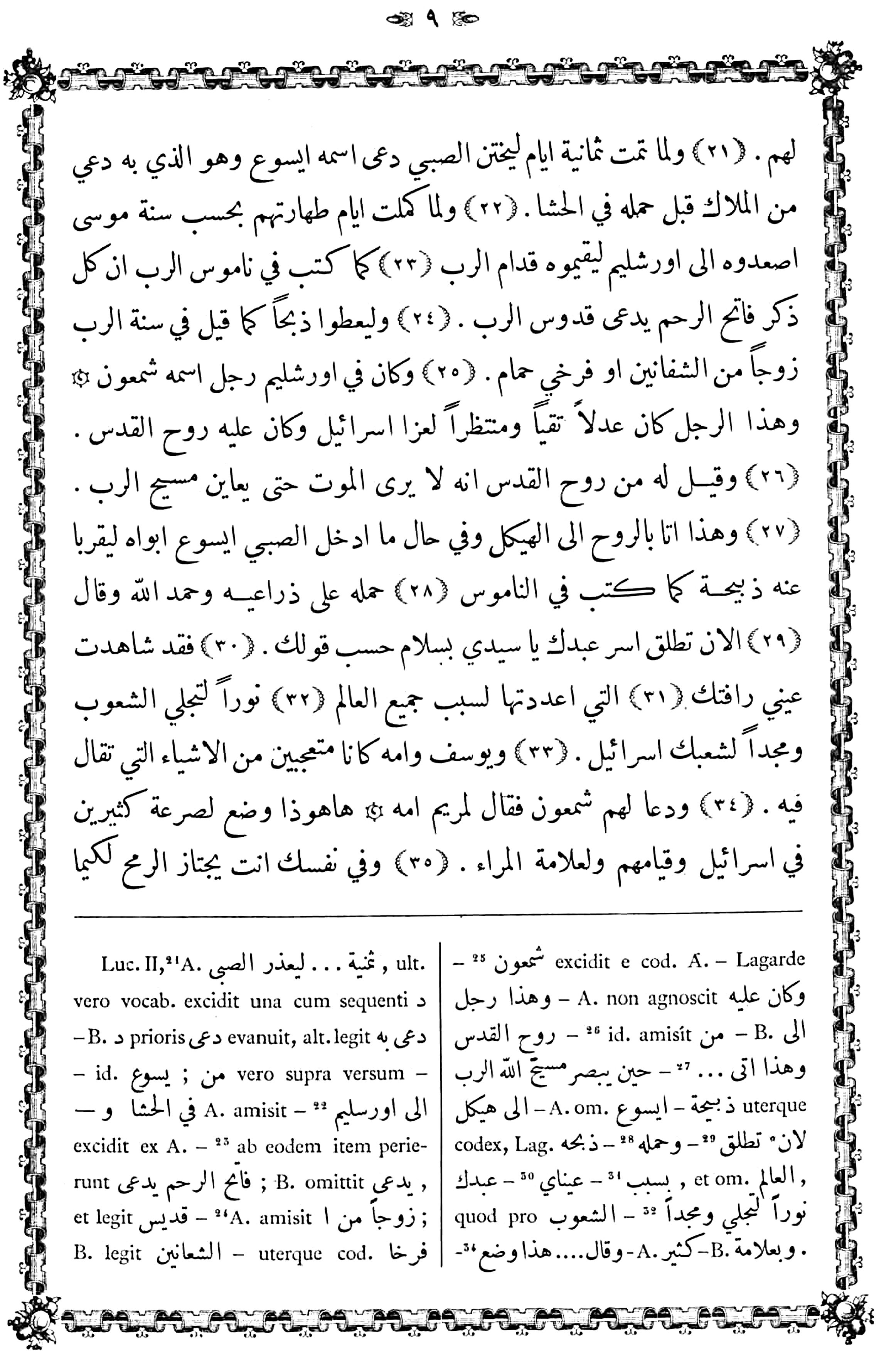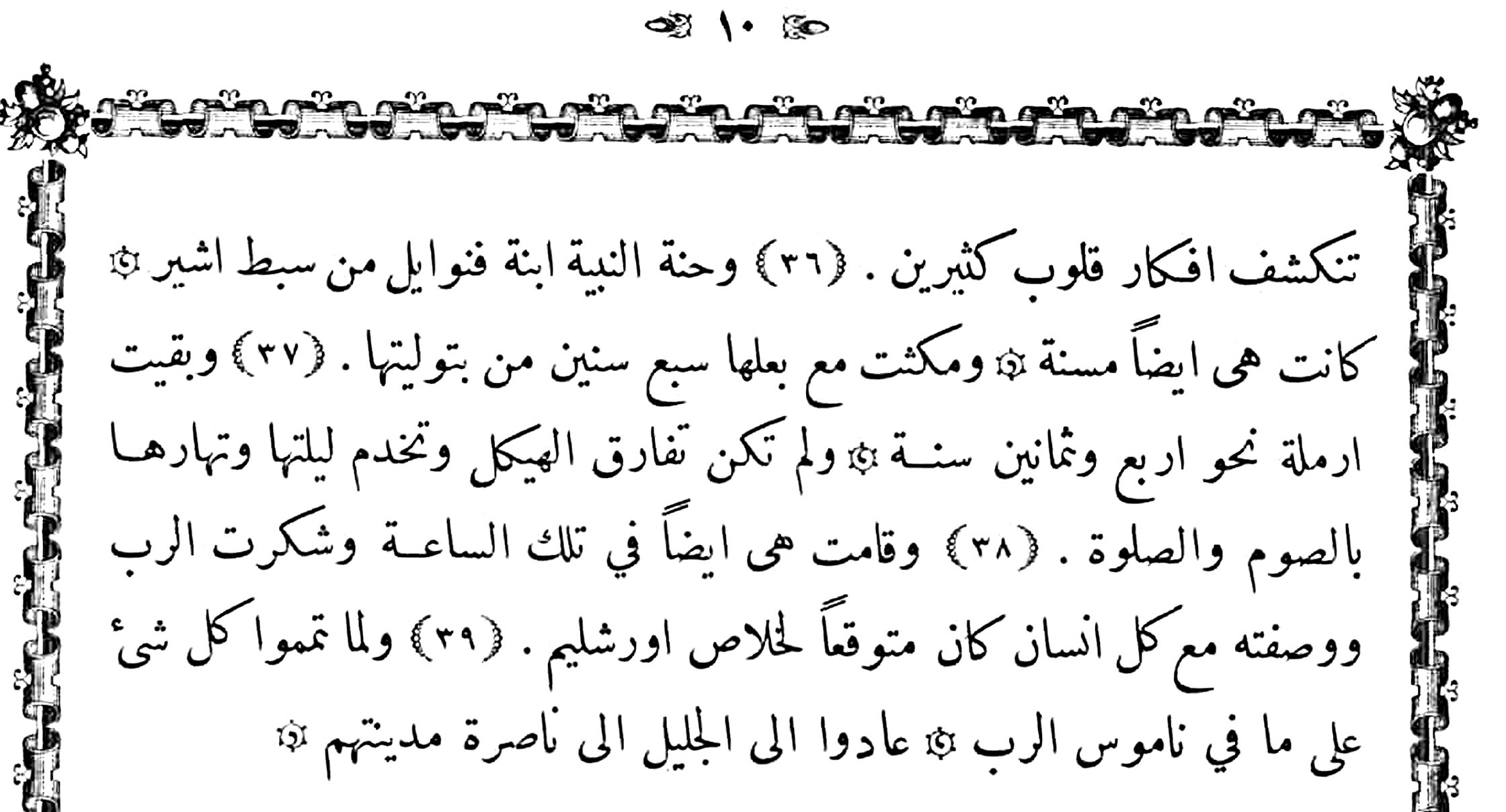
▾
Tatian, The Diatessaron
⎗←→⎘
Section II.
[1] [Arabic, p. 7] 99 Matt. i. 18.Now100 This is preceded in Vat. ms. by the genealogy, Matt. i. 1–17 (see Introduction, 13), with the marginal note The Beginning of the Gospel of Matthew. (Lagarde, op. cit., 1886, p. 154.) The text presents nothing worthy of note in this place except that verse 16, construed on the same principle as the preceding verses, to which, except in the words printed in italics, it is strictly parallel in construction, reads thus: “Jacob begat Joseph, the husband of Mary, who of her begat Jesus, the Messiah” (cf. the remarkable reading of Sin. Syriac). As it stands, this is the only possible interpretation of the words, for who is masculine. But a mistake in the gender of a relative pronoun is very common in Arabic among illiterate people, while in Syriac there is, to begin with, no distinction. If then we correct the relative, who of her will become of whom (fem.), and begat will of course be construed as passive. We thus get the text followed in Ibn-at-Tayyib’s Commentary, the ordinary reading of the Peshitta, of whom was born Jesus. the birth of Jesus the Messiah was on this wise: In the time when his mother was given in marriage to Joseph, before they came together, [2] she was found with child of the Holy Spirit. 101 Matt. i. 19.And Joseph her husband was a just man and did not wish to expose her, and he purposed to put her away secretly. [3] 102 Matt. i. 20.But when he thought of this, the angel of the Lord appeared unto him in a dream, and said unto him, Joseph, son of David, fear not to take Mary thy wife, for that [4] which is begotten103 The Arabic might even more naturally be rendered born, thus giving us the reading that Isho‘dad tells us was that of the Diatessaron (Harris, Fragments, p. 16 f.); but throughout the whole genealogy (see § 1, 81, note) this word has been used by the Vat. ms. in the sense of begat. Here the Borg. ms. has of her for in her; but Ibn-at-Tayyib in his Commentary discusses why Matthew wrote in and not of. in her is of the Holy Spirit. 104 Matt. i. 21.She shall bear a son, and thou shalt [5] call his name Jesus, and he shall save105 cf. § 1, 78. his people from their sins. 106 Matt. i. 22.And all this was that the saying from the Lord by the prophet might be fulfilled:
[6] 107 Matt. i. 23.Behold, the virgin shall conceive, and bear a son,
And they shall call his name Immanuel,
[7] which is, being interpreted, With us is our God. 108 Matt. i. 24.And when Joseph arose from his [8] sleep, he did as the angel of the Lord commanded him, and took his wife; 109 Matt. i. 25a.and knew her not until she brought forth her firstborn son.
[9] 110 Luke ii. 1.And in those days there went forth a decree from Augustus Cæsar that all the [10] people of his dominion111 The Arabic expression is clearly meant to represent that used in the Peshitta. should be enrolled. 112 Luke ii. 2.This first enrolment was113 This is the most natural meaning of the Arabic sentence; which, however, is simply a word-for-word reproduction. while Quirinius [11, 12] was governor of Syria. 114 Luke ii. 3.And every man went to be enrolled in his city. 115 Luke ii. 4.And Joseph went up also from Nazareth, a city of Galilee, to Judæa, to the city of David [13] which is called Bethlehem (for he was of the house of David and of his tribe), 116 Luke ii. 5.with [14] [Arabic, p. 8] Mary his betrothed, she being with child, to be enrolled there. 117 Luke ii. 6.And while [15] she was there the days for her being delivered were accomplished. 118 Luke ii. 7.And she brought forth her firstborn son; and she wrapped him in swaddling cloths and laid him in a manger, because there was no place for them where they were staying.
[16] 119 Luke ii. 8.And there were in that region shepherds abiding, keeping their flock in the watch [17] of the night. 120 Luke ii. 9.And behold, the angel of God came unto them, and the glory of the [18] Lord shone upon them; and they were greatly terrified. 121 Luke ii. 10.And the angel said unto them, Be not terrified; for I bring you tidings of great joy which shall be to the [19] whole world; 122 Luke ii. 11.there is born to you this day a Saviour, which is the Lord the Messiah, [20] in the city of David. 123 Luke ii. 12.And this is a sign for you: ye shall find a babe wrapped [21] in swaddling cloths and laid in a manger. 124 Luke ii. 13.And there appeared with the angels suddenly many heavenly forces praising125 The Arabic represents Syr. idiom. God and saying,
[22] 126 Luke ii. 14.Praise be to God in the highest,
And on the earth peace, and good hope to men.
[23] 127 Luke ii. 15.And when the angels departed from them to heaven, the shepherds spake to one another and said, We will go to Bethlehem and see this word which hath been, as [24] the Lord made known unto us. 128 Luke ii. 16.And they came with haste, and found Mary and [25] Joseph, and the babe laid in a manger. 129 Luke ii. 17.And when they saw, they reported the word [26] which was spoken to them about the child. 130 Luke ii. 18.And all that heard wondered at the [27] description which the shepherds described131 cf. § 1, 66, note. to them. 132 Luke ii. 19.But Mary kept these133 Borg. ms. inserts all above the line, after these. The meaning ought then to be, these things, namely, all the sayings. sayings [28] and discriminated134 The Arab. might mean set them apart; but the Syriac is against this. them in her heart. 135 Luke ii. 20.And those shepherds returned, magnifying and praising God for all that they had seen and heard, according as it was described unto them.
[29] [Arabic, p. 9] 136 Luke ii. 21.And when eight days were fulfilled that the child should be circumcised, his name was called Jesus, being that by which he was called by the angel before his conception in the womb.
[30] 137 Luke ii. 22.And when the days of their purification according to the law of Moses were [31] completed, they took him up to Jerusalem to present him before the Lord 138 Luke ii. 23.(as it is written in the law of the Lord, Every male opening the womb shall be called the [32] holy thing of the Lord), 139 Luke ii. 24.and to give a sacrificial victim as it is said in the law of [33] the Lord, A pair of doves or two young pigeons. 140 Luke ii. 25.And there was in Jerusalem a man whose name was Simeon; and this man was upright and pious, and expecting [34] the consolation of Israel; and the Holy Spirit was upon him. 141 Luke ii. 26.And it had been said unto him by the Holy Spirit, that he should not see death till he had seen with [35] his eyes the Messiah142 Or, anointed. of the Lord. 143 Luke ii. 27.And this man came by the Spirit to the temple; and at the time when his parents brought in the child Jesus, that they might [36] present for him a sacrifice, as it is written in the law, 144 Luke ii. 28.he bare him in his arms and praised God and said,
[37] 145 Luke ii. 29.Now loosest thou the bonds of thy servant, O Lord, in peace,146 For order cf. (in part) Sin. Syriac.
According to thy saying;
[38] 147 Luke ii. 30.For mine eye hath witnessed thy mercy,
[39] 148 Luke ii. 31.Which thou hast made ready because of the whole world;
[40] 149 Luke ii. 32.A light for the unveiling150 i.e., becoming manifest. of the nations,
And a glory to thy people Israel.
[41] 151 Luke ii. 33.And Joseph and his mother were marvelling at the things which were being said [42] concerning him. 152 Luke ii. 34.And Simeon blessed them and said to Mary his mother, Behold, he is set for the overthrow and rising of many in Israel; and for a sign of contention; [43] 153 Luke ii. 35.and a spear154 So also in Syriac versions and the quotation of Isho’dad from Ephraem (Harris, Fragments, p. 34), but not the Armenian version. shall pierce155 The Arabic sides with the Peshitta and Ibn-at-Tayyib’s Commentary, against the remarkable reading of Sin. supported by Isho’dad, as in last note (Syriac text), and the Armenian in Hill, p. 336. See now also The Guardian, Dec. 18, 1895. through thine own soul; that the thoughts of the [44] [Arabic, p. 10] hearts of many may be revealed. 156 Luke ii. 36.And Anna the prophetess, the daughter of Phanuel, of the tribe of Asher, was also advanced in years (and she dwelt [45] with her husband seven years from her virginity, 157 Luke ii. 37.and she remained a widow about eighty-four years); and she left not the temple, and served night and day with [46] fasting and prayer. 158 Luke ii. 38.And she also rose in that hour and thanked the Lord, and she [47] spake of him with every one who was expecting the deliverance of Jerusalem. 159 Luke ii. 39.And when they had accomplished everything according to what is in the law of the Lord, they returned to Galilee, to Nazareth their city.



